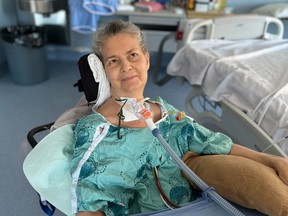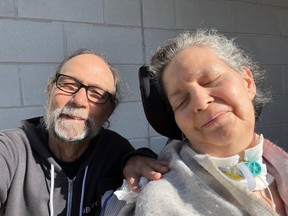More than a year and a half after a tick bite, MaryAnn Harris still breathes with a ventilator and remains nearly paralyzed.

Article content
It was Labour Day 2021 when MaryAnn Harris told her husband she was feeling tired and needed to go upstairs to lie down.
Advertisement 2
Article content
A few hours later she was feeling nauseous. She complained of double vision. Her husband, Charles de Lint, immediately called Telehealth Ontario, when the nurse told them to go straight to the emergency department.
Overnight she got encephalitis, a swelling of her brain. By the next morning, MarryAnn was in the ICU on life support, breathing with a ventilator.
“They didn’t know what was wrong,” said Charles, a popular author of fantasy novels, a three-time Aurora Award winner, and a member of Canada’s Science Fiction Writers Hall of Fame. “They assumed it was a virus of some sort. It looked like they had 70 little machines feeding her different kinds of antibiotics.”
Today, more than a year and a half after falling ill, MaryAnn hasn’t been back home. She still breathes with a ventilator and remains nearly paralyzed.
Advertisement 3
Article content
The culprit? A tick bite that transmitted the rare but increasingly common Powassan virus, a potentially deadly pathogen that caused encephalitis.
“We were never aware of the bite. We never even saw the tick,” Charles said. MaryAnn fell ill during the lockdown and the couple hadn’t travelled anywhere.
They figure she picked up the tick bite either in the yard of their Alta Vista area home or during one of their frequent walks around the community gardens in Pleasant Park. And it’s hardly the only question that can never be answered.
“If she was going to get sick,” Charles asks, “why did it have to be something so rare?”
Powassan virus was first identified in 1958 when it infected and killed a young boy in Powassan, Ont., on the outskirts of North Bay, 200 km northwest of Ottawa. Until 1998, there had been only 27 cases in all of North America. Since then, the numbers have been rising: 5-10 cases a year in the U.S. from 2010 to 2015; and 25-30 a year since. Since 2017, there have been 21 cases in Canada. Most infections occur in the northeastern U.S., Eastern Canada and the Great Lakes region.
Article content
Advertisement 4
Article content
In 2019, North Carolina Senator Kay Hagan died of Powassan virus several years after being bitten by a tick.
The virus is usually transmitted by Ixodes scapularis, commonly known as the deer or black-legged tick, the same vector for Lyme disease. While it takes 24 to 48 hours for a tick to transfer the bacteria that causes Lyme disease to its human host, a person can be infected with Powassan virus in as little as 15 minutes after the tick attaches.
Powassan symptoms appear between one and five weeks later. In most cases, the person doesn’t even know they’re infected, passing it off as a mild flu. But for an unfortunate few, the sickness can be severe. About half develop encephalitis or meningitis, leading to lifelong neurological disorders.
Advertisement 5
Article content
“There’s been a slow and steady increase in the number of cases reported,” said Saravanan Thangamani, director of the Center for Vector-Born Diseases at the State University of New York in Syracuse. “This is a rare virus. However, it is a dangerous virus. It can be fatal and those that survive can have long-term neurological consequences for the rest of their lives.”

MaryAnn’s symptoms were classic Powassan: fever, headaches, vomiting, weakness, tremors, seizures and paralysis.
The disease is fatal in 10-15 per cent of cases. There is no cure, nor is there an established treatment beyond normal recuperative therapy.
Still, Charles doesn’t dwell on the disease or how MaryAnn caught it. He’s focused on the road ahead.
Advertisement 6
Article content
“Ok. She got bit by a tick. She has Powassan. She got encephalitis,” he said. “For me, I’m more interested in what’s happening now, not what happened before.”
MaryAnn’s recovery now depends on physiotherapy, but that’s been hampered by fluids that build up and constantly have to be suctioned out of her throat. Even before she got Powassan virus, she had immune problems and suffered from a build-up of fluids.
“It’s constantly in her throat and esophagus. She’s stuck on a ventilator and she’s constantly in need of being suctioned,” Charles said. “It’s an exhausting process so we’re not making a whole lot of headway with other stuff. We do exercises every day and she’s really good about it. Even when she’s exhausted she’ll still do it. But it’s just not going very fast because of these secretions.”
Advertisement 7
Article content
The couple — Charles is 71 and MaryAnn is 70 — have been together for 47 years and married for 42. With their guitar and banjo, they are well-known in Ottawa’s folk and bluegrass music scene.

Charles’s novels, many of them set in the fantasy city of Newford, have a worldwide following. MaryAnn is his business manager, editor and illustrator. Her illness has left Charles with little time to write since he now spends five hours a day at Saint-Vincent Hospital, six days a week. He pays for a caregiver on the seventh.
Friends, family and fans have rallied around the couple. Musicians have visited the hospital to play for MaryAnn. A GoFundMe started to help pay for the many expenses they now face has topped $90,000. Fans have also subscribed to Charles’s Patreon account to help support his writing.
Advertisement 8
Article content
One fan, Julie Bartel, manages the GoFundMe and posts regular updates on MaryAnn’s progress on social media. Bartel, 52, grew up in tiny Orem, Utah, and as a teenager immersed herself in Charles’s fantasy novels.
“There was nothing in Orem but apple orchards and Mormons. You couldn’t even buy a coffee,” she said.
“I read Charles’s books all the way through high school. It’s not an exaggeration to say that they were a lifeline for me. That theme of estrangement — of being an outsider.”
Bartel met Charles and MaryAnn at a literary conference in Salt Lake City two decades ago and the fan turned into a friend. She’s visited them in Ottawa and together they’ve taken road trips across the U.S., guitars and banjos strapped to the roof, Charles dutifully writing on desert mornings.
Advertisement 9
Article content
“We immediately bonded over our mutual love of Buffy the Vampire Slayer,” Bartel jokes.
With MaryAnn in hospital, Bartel has pitched in to help proofread some of Charles’s writing. She’s collecting “sweet thoughts” that fans email for Charles to share with MaryAnn.
“It’s hard being friends and being so far away. I’m so grateful that I can give back in some way,” said Bartel. “At least she’s able to talk now.”
She describes MaryAnn as “a rock star” who faithfully does her exercises every day, determined to get better even if her progress has been glacially slow. She marvels at Charles’s dedication and devotion to MaryAnn’s care.
“They really are the most wonderful people. It’s an amazing love story.”
Meanwhile, MaryAnn bides her time in hospital. Charles manages her care, carefully protecting her from stresses that might trigger anxiety. Unable to move herself, she uses Siri to do what she can on her iPhone.
Advertisement 10
Article content
“She’s very stoic about it, but it’s really hard,” Charles said. “There’s just not a whole lot she can do. She can listen to audiobooks and podcasts, but that’s about all. Her vision is not doubled anymore, but it’s still not great so she can’t read. She has no real movement in her limbs, so she can’t operate her phone or her iPad.
“As helpful as those items are, they aren’t as handy as one might think. MaryAnn can use Siri on her phone to listen to music or start an audiobook, for example, but she can’t necessarily make it stop: Siri can’t hear her when the music is playing.”
Through a friend, the couple was put in touch with another woman who contracted Powassan virus four years before MaryAnn and has mostly recovered. It’s a glimmer of hope.
“She’s not fully recovered, but she walks around and she’s able to garden. She’s an artist — like MaryAnn — so she can paint again. She can play her piano again, at least to some degree,” Charles said.
“Ultimately, our hopes are for a full recovery — to get her moving and get her back home. With Powassan, there’s so little known about it, it’s hard to know what’s going to happen.”
https://news.google.com/rss/articles/CBMikAFodHRwczovL290dGF3YWNpdGl6ZW4uY29tL25ld3MvbG9jYWwtbmV3cy9tYXJ5YW5ucy1zdHJ1Z2dsZS1jb21tdW5pdHktcmFsbGllcy10by1oZWxwLW90dGF3YS13b21hbi1kZWJpbGl0YXRlZC1ieS1yYXJlLXRpY2stYm9ybmUtcG93YXNzYW4tdmlydXPSAb4BaHR0cHM6Ly9vdHRhd2FjaXRpemVuLmNvbS9uZXdzL2xvY2FsLW5ld3MvbWFyeWFubnMtc3RydWdnbGUtY29tbXVuaXR5LXJhbGxpZXMtdG8taGVscC1vdHRhd2Etd29tYW4tZGViaWxpdGF0ZWQtYnktcmFyZS10aWNrLWJvcm5lLXBvd2Fzc2FuLXZpcnVzL3djbS85OWI2ZDRlYi0zYzVmLTRlNjYtYTJmOC02ZGMwN2U4NzcyYjQvYW1wLw?oc=5
2023-03-17 10:07:58Z
CBMikAFodHRwczovL290dGF3YWNpdGl6ZW4uY29tL25ld3MvbG9jYWwtbmV3cy9tYXJ5YW5ucy1zdHJ1Z2dsZS1jb21tdW5pdHktcmFsbGllcy10by1oZWxwLW90dGF3YS13b21hbi1kZWJpbGl0YXRlZC1ieS1yYXJlLXRpY2stYm9ybmUtcG93YXNzYW4tdmlydXPSAb4BaHR0cHM6Ly9vdHRhd2FjaXRpemVuLmNvbS9uZXdzL2xvY2FsLW5ld3MvbWFyeWFubnMtc3RydWdnbGUtY29tbXVuaXR5LXJhbGxpZXMtdG8taGVscC1vdHRhd2Etd29tYW4tZGViaWxpdGF0ZWQtYnktcmFyZS10aWNrLWJvcm5lLXBvd2Fzc2FuLXZpcnVzL3djbS85OWI2ZDRlYi0zYzVmLTRlNjYtYTJmOC02ZGMwN2U4NzcyYjQvYW1wLw


Comments
Postmedia is committed to maintaining a lively but civil forum for discussion and encourage all readers to share their views on our articles. Comments may take up to an hour for moderation before appearing on the site. We ask you to keep your comments relevant and respectful. We have enabled email notifications—you will now receive an email if you receive a reply to your comment, there is an update to a comment thread you follow or if a user you follow comments. Visit our Community Guidelines for more information and details on how to adjust your email settings.
Join the Conversation